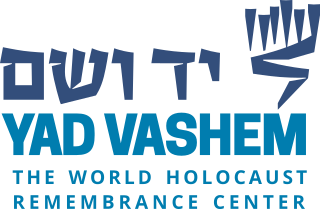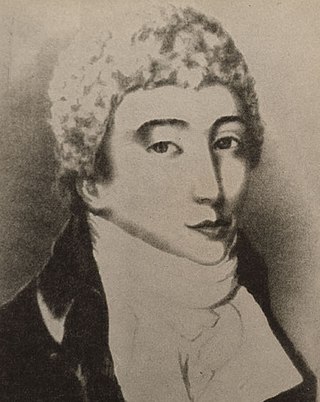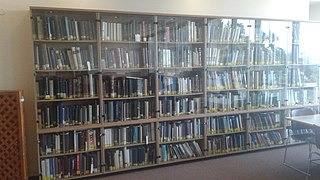
Yad Vashem is Israel's official memorial to the victims of the Holocaust. It is dedicated to preserving the memory of the Jews who were murdered; echoing the stories of the survivors; honoring Jews who fought against their Nazi oppressors and gentiles who selflessly aided Jews in need; and researching the phenomenon of the Holocaust in particular and genocide in general, with the aim of avoiding such events in the future. Yad Vashem's vision, as stated on its website, is: "To lead the documentation, research, education and commemoration of the Holocaust, and to convey the chronicles of this singular Jewish and human event to every person in Israel, to the Jewish people, and to every significant and relevant audience worldwide."

Kremenets is a city in Ternopil Oblast, western Ukraine. It is the administrative center of the Kremenets Raion, and lies 18 kilometres (11 mi) north-east of the great Pochayiv Monastery. The city is situated in the historic region of Volhynia and features the 12th-century Kremenets Castle. It hosts the administration of Kremenets urban hromada, one of the hromadas of Ukraine. Population: 20,476.

Jewish cemeteries of Warsaw refers to a number of Jewish necropolises in the city.

Judenfrei and judenrein are terms of Nazi origin to designate an area that has been "cleansed" of Jews during The Holocaust. While judenfrei refers merely to "freeing" an area of all of its Jewish inhabitants, the term judenrein has the even stronger connotation that any trace of Jewish blood had been removed as an alleged impurity in the minds of the criminal perpetrators. These terms of racial discrimination and racial abuse are intrinsic to Nazi anti-Semitism and were used by the Nazis in Germany before World War II and in occupied countries such as Poland in 1939. Judenfrei describes the local Jewish population having been removed from a town, region, or country by forced evacuation during the Holocaust, though many Jews were hidden by local people. Removal methods included forced re-housing in Nazi ghettos especially in eastern Europe, and forced removal or Resettlement to the East by German troops, often to their deaths. Most Jews were identified from late 1941 by the yellow badge as a result of pressure from Joseph Goebbels and Heinrich Himmler.
Gary Mokotoff (born April 26, 1937) is an author, lecturer, and Jewish genealogy researcher. Mokotoff is the publisher of AVOTAYNU, the International Review of Jewish Genealogy, and is the former president of the International Association of Jewish Genealogical Societies (IAJGS). He is the creator of the JewishGen's Jewish Genealogical Family Finder and the Jewish Genealogical People Finder. He co-authored the Daitch–Mokotoff Soundex system. Mokotoff is co-author of Where We Once Walked: A Guide to the Jewish Communities Destroyed in the Holocaust.

Aaron Philip Hart was a businessman in Lower Canada and one of the first Jews to settle in the colony. He is considered the father of Canadian Jewry. He was one of the founding members of the Spanish and Portuguese Synagogue of Montreal, a wealthy man with numerous landed estates, and the married father of four sons, including the future politician Ezekiel Hart, and four daughters.
Benjamin Meed, a Polish Jew, fought in the Warsaw ghetto underground, served on the Advisory Board of the President's Commission on the Holocaust, planned the 1981 World Gathering of Jewish Holocaust Survivors and the 1983 American Gathering of Jewish Holocaust Survivors held in Washington, D.C., and other reunions that followed, and was President of the American Gathering of Jewish Holocaust Survivors and their Descendants.

Chechelnyk is a rural settlement on the Savranka River in Vinnytsia Oblast, Ukraine, near Odesa Oblast, located in the historic region of Podolia. Chechelnyk was formerly the administrative center of Chechelnyk Raion, although it is now administrated under the Haisyn Raion. The economy is based on the food industry, especially alcohol production. Population: 4,785
Arthur Kurzweil is an American author, educator, editor, writer, publisher, and illusionist.

Radzanów is a village in Mława County, Masovian Voivodeship, in east-central Poland, approximately 28 kilometres (17 mi) south-west of Mława and 101 km (63 mi) north-west of Warsaw. It is the seat of the gmina called Gmina Radzanów.

The Jewish cemetery of Khotyn, Ukraine.

JewishGen is a non-profit organization founded in 1987 as an international electronic resource for Jewish genealogy. In 2003, JewishGen became an affiliate of the Museum of Jewish Heritage – A Living Memorial to the Holocaust in New York City. It provides amateur and professional genealogists with the tools to research their Jewish family history and heritage.

Jewish genealogy is the study of Jewish families and the tracing of their lineages and history. The Pentateuchal equivalent for "genealogies" is "toledot" (generations). In later Hebrew, as in Aramaic, the term and its derivatives "yiḥus" and "yuḥasin" recur with the implication of legitimacy or nobility of birth. In Modern Hebrew, genealogy is generally referred to as "שורשים"/"shorashim", the Hebrew word for roots, or borrowing from the English, "גנאלוגי"/"genealogi".

Chamber of the Holocaust is a small Holocaust museum located on Mount Zion in Jerusalem, Israel. It was Israel's first Holocaust museum.
Sallyann Sack-Pikus is an American genealogist and psychologist, and editor of Avotaynu Magazine, a journal of Jewish genealogy and scholarship. Sack is the only genealogist listed in Jewish Women in America.

Yizkor books are memorial books commemorating a Jewish community destroyed during the Holocaust. The books are published by former residents or landsmanshaft societies as remembrances of homes, people and ways of life lost during World War II. Yizkor books usually focus on a town but may include sections on neighboring smaller communities.

Miriam Weiner is an American genealogist, author, and lecturer who specializes in the research of Jewish roots in Poland and the former Soviet Union. Weiner is considered to be one of the pioneers of contemporary Jewish genealogy through her work to open up archives and is described as a trail-blazing, highly respected guide and leading authority on archival holdings and resources in pre-war Belarus, Lithuania, Moldova, Poland, and Ukraine.
Vivienne Roumani-Denn is an American oral historian and filmmaker. She created the first web site of the Jews of Libya and she is the director of critically acclaimed films The Last Jews of Libya and Out of Print.













